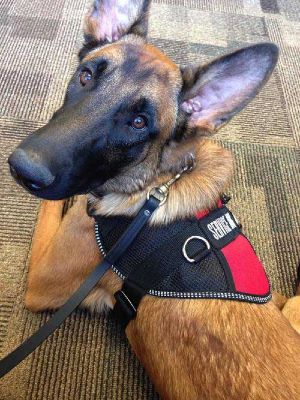Request a Free Assessment

The Americans with Disabilities Act (ADA) defines a service dog as “a dog that is individually trained to do work or perform tasks for a person with a disability.” Disabilities include mental or physical impairments that affect an individual’s ability to perform one or more major life activities (walking, seeing, etc.). Service dogs are trained to guide and assist such individuals so that they can lead happier, healthier lives.
Because service dogs play such a key role in the life of disabled individuals, they are protected by the law. Places of residence, employment, and commercial facilities cannot discriminate against disabled individuals with service animals. If you are wondering how to get a service dog, you can either purchase a fully trained dog or purchase a service puppy and train it.
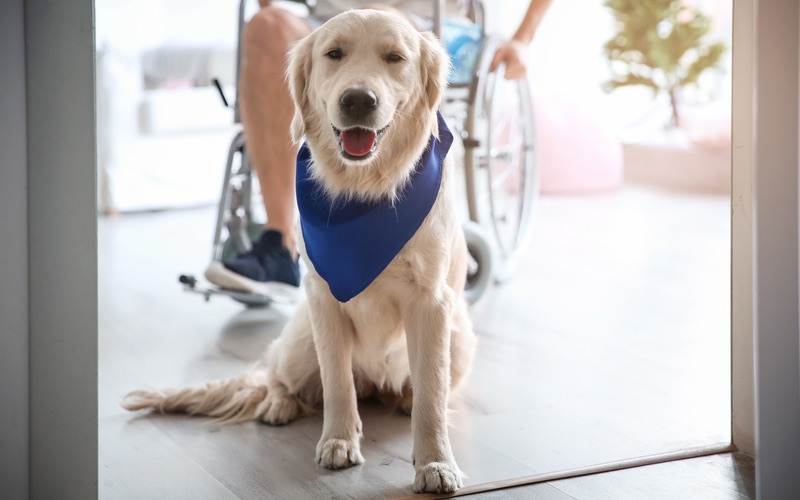
Not all training packages may be available at our Dog Training Elite West Valley location, please reference our pricing page for complete information on services offered.
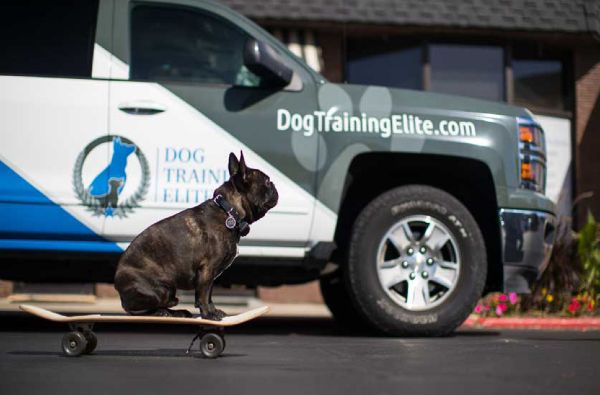
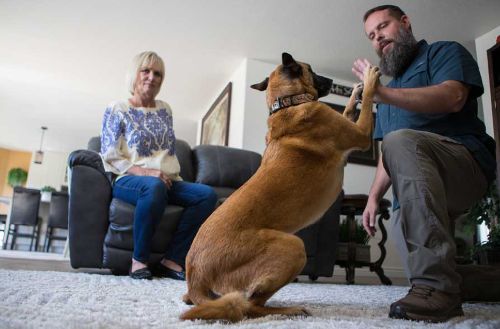
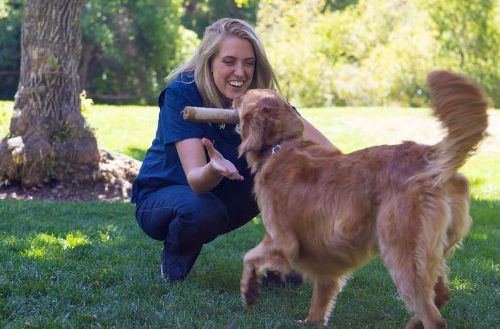

Is A Service Dog The Same As A Therapy Dog?
Many types of working dogs increase the quality of life for their handlers. The three main categories of working dogs are service animal, therapy animal, and emotional support animal. Each category covers different areas of support and different levels of protection under the law.
-
Service Animal
As mentioned above, service animals assist individuals with disabilities. Depending on the person’s needs, the service animal learns how to perform certain tasks. Guide dogs, for example, help blind individuals safely navigate their environment. Seizure response dogs respond to their handlers when the individual is having a seizure. Service animals are highly trained and specialized, and they are also offered the most protection under the law compared to therapy or emotional support animals.
Dogs are not the only kinds of service animals - miniature horses, pigs, and monkeys are often trained to support individuals with disabilities!
-
Therapy Animal
Therapy dogs provide comfort and improve the mental well-being of individuals in hospitals, hospice care, retirement homes, nursing homes, schools, and more. These dogs must have a friendly, calm demeanor and be comfortable when handled by strangers. Therapy dogs are not trained to perform specific tasks, but they must be obedient and well-mannered. Therapy animals are permitted in some areas where pets are not, but they have fewer protections than service animals. All therapy dogs must be certified before they can offer their services to the community.
-
Emotional Support Animal
Emotional support dogs relieve loneliness, anxiety, depression, and other symptoms of mental health disorders. They provide comfort to their handlers, but they are not trained to perform specific tasks. Most emotional support animals are sensitive to the emotional changes of their handler and will stay close by at all times. Emotional support animals are not protected by the ADA, but residential buildings must permit emotional support animals.
Our Balanced Theory
We base our training around the "Classical Conditioning" model (a.k.a. "Pavlovian" or "respondent conditioning"). This includes developing conditioned or automatic reflexes to commands. In its simplest form (after proper conditioning), when the owner says "sit," the dog automatically sits without thinking about it. Our unique techniques ensure our program is a success no matter what behavior we encounter.
Empowering Owners
We empower owners to train so their dog knows who to obey at all times.
Personalized
We deal with problem behaviors on a personal basis.
Environment Specific
We train wherever issues tend to arise (i.e. jogging, park, home).
Supportive
We support owners in the off-hours (when training is "not in session").
Involved
We work with all members of the household.
Simplified & Customized
We plan training around the owner's schedule and require only 20 min/day follow-up practice.
Continued Training
Additional programs / group sessions offered after in-home training.
Lifetime Investment
We follow up & are invested in the owner's success long-term.
Satisfaction Ratings
Our high client satisfaction rating sets us apart from competitors.
clas·si·cal con·di·tion·ing PSYCHOLOGY noun A learning process that occurs when two stimuli are repeatedly paired; a response that is at first elicited by the second stimulus and is eventually elicited by the first stimulus alone.
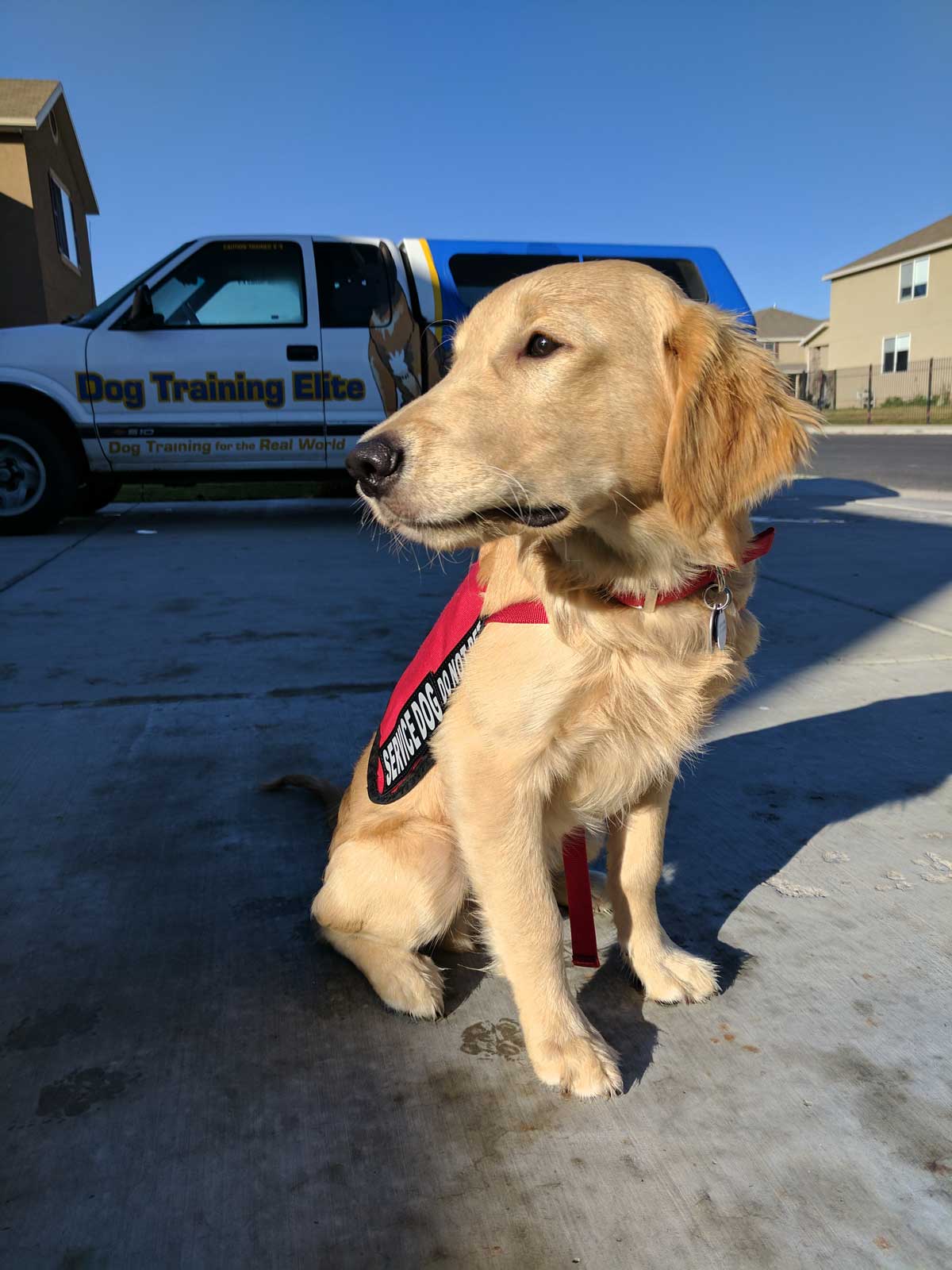
What Can Service Dogs Do?
Perform Tasks
Service dogs are a great help to disabled individuals thanks to their incredible ability to perform highly specialized tasks, like opening doors, switching lights on and off, assisting with balance and stability, guiding, pulling wheelchairs, answering phones and making calls, finding objects or places, unloading and loading items, clearing rooms, finding help, and many more. Service dogs improve the lives of disabled individuals by increasing their autonomy.
Alert Handlers
Individuals with certain diseases and disorders can benefit from a highly trained service dog. Dogs have an incredible sense of smell and they can detect the chemical changes associated with oncoming seizures and increases in blood pressure. Alert service dogs alert their handler to these situations to prevent a life-threatening emergency. Alert dogs also help those with extreme allergies detect potential allergens in food.
Assist in Emergency
Disabled or epileptic individuals are more prone to emergencies than the average person. Service dogs are trained to alert their handler to a potential emergency, and alert surrounding individuals to an active emergency. Service dogs can also call for help on pre-programmed phones.
Support Mental Well Being
Service dogs trained to assist handlers with severe anxiety or depression will perform specific tasks that reduce the potential for panic attacks or self-harm attempts. Such tasks include deep-pressure therapy, tactile stimulation, alerting, clearing rooms, blocking strangers from approaching, and more. Service dogs trained to assist those with Post Traumatic Stress Disorder (PTSD) have greatly improved the lives of many veterans.
Service dogs also make a big impact on the lives of children with autism. Children with autism are often prone to meltdowns, have trouble communicating, and are quick to run off or become easily lost. Service dogs prevent and mediate all of these behaviors to provide a higher quality of life for children with autism and their families.
As autism is a spectrum disorder, each child has varying needs of assistance. Autism service dogs perform the following tasks:
-
Tracking
Children with autism often wander away, and a parent’s worst fear is turning their back for just a moment and then discovering their child is gone. Autism service dogs will track the child if this ever happens. -
Tethering
This task minimizes wandering, which is common in public settings. The child is tethered to the service dog’s leash or harness, preventing him or her from wandering away. -
Behavior Interruption
Repetitive and ritualistic behaviors are typical of autistic children, as are meltdowns when the child becomes overstimulated. Autism service dogs recognize these negative behaviors and redirect the child’s attention when they start. A simple paw or nudge is all it takes to prevent a meltdown.
Service dogs are crucial in assisting individuals with various disabilities and conditions, providing them with support, independence, and companionship. These highly trained dogs can perform specific tasks tailored to the needs of their handlers. Learn about breeds that make great service dogs, who can benefit from a service dog and the training that will help these pups meet their handler's needs. Take the first step towards a better future with a trained service dog by contacting Dog Training Elite Arizona today!

How Do I Get A Service Dog?
If you are wondering how to get a service dog, there are a couple of different approaches. Some service dogs are purchased outright, fully trained. Or a compatible dog is selected and trained from an early age. Training a dog from the start is the best option, especially for those with specialized needs.
Training a dog to perform service responsibilities must start from day one. Only certain breeds are suited to service work, and breeders put a lot of time into raising puppies to be service animals. Once you have purchased a service puppy, additional training is necessary to prepare your puppy for life as a service dog. This is a complicated process that involves various steps. Dog Training Elite of Glendale / Peoria makes getting a service dog easier with our service dog training program.
Our talented trainers can help select puppies that are prepared for a life of service from well-respected breeders. When these puppies enter the service dog training program they are closely monitored for behavior and temperament and can be fully obedience trained by the age of six months. These puppies undergo extensive socialization and additional training to ensure they are well-suited for service and therapy needs including specialized service training alongside the new handler.
This program is ideal for handlers who want to take part in the developmental years and extensive training of their service puppy.
Se habla español!
Popular Areas of Focus
Service Dog Pricing & Packages
Not all training packages may be available at our Dog Training Elite West Valley location, please reference our pricing page for complete information on services offered.
Psychiatric / PTSD Support Dog
12 One-on-One & 52 Group Sessions
$7,495
A Psychiatric/PTSD service dog will be able to go anywhere with their handler and assist them in times of high stress and provide a sense of security. A service dog will provide emotional support, reintegration into society, reduce depression, help cope with anxiety, reduce the frequency and severity of flashbacks, anchor handler to the present, and reduce suicidal ideation. Psychiatric service dog tasks are customizable, but examples include:
- Grounding
- Deep Pressure Therapy
- Panic Response
- Create a Physical Buffer
- Interrupt Repetitive Behaviors
Mobility Support Dog Training
20 One-on-One & 52 Group Sessions
$12,995
A mobility support dog can increase an individual's independence and quality of life by assisting with tasks that are difficult or impossible to complete on their own. A brace and mobility support dog can be taken anywhere and are trained to their handlers specific mobility and ambulatory needs. Mobility service dog tasks are customizable, but examples include:
- Forward Momentum Pull
- Counterbalance
- Open Doors with Adaptive Equipment
- Turn Lights On/Off
- Item Retrieval
Personalized Autism Canines
16 One-on-One & 52 Group Sessions
$9,995
Personalized autism canines provide an emotional anchor for children with autism and a sense of security to family members. The autism world is widely accepting of service dogs, as overwhelming results show psychological benefits for the child in addition to the entire family. Autism support service dog tasks are customizable, but examples include:
- Deep Pressure Therapy
- Anchor a Child Who Wanders
- Sensory Assistance
- Find Help
- Redirect Repetitive Behaviors
Medical Alert Service Dog
Call for Details
Living a balanced and independent life with chronic illness is not usually easy. Alert dogs for these individuals provide the stability, safety and support that allows for increased activity and peace of mind. Dog Training Elite offers free in-home evaluations to assess if a current family dog can be trained to become a medical alert service dog or can help you select a dog for training. Examples of medical alert dog tasks include but are not limited to:
- Alerting to Blood Sugar Levels / Medical Episodes
- Retrieving Medicine
- Altering Others / Getting Help
- Medical Response & Mitigation
- Additional tasks as needed, must be approved by trainer
